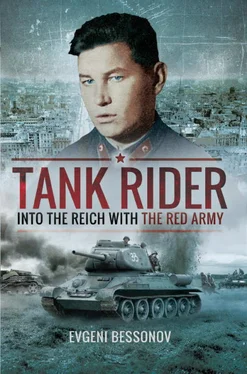Before we could cross many streets, German infantry with two armoured personnel carriers showed up in our rear. It was as if they were waiting for us to go deeper into the city and then cut us off from the battalion staff. There was not much infantry, but the Germans were armed with machine-guns, the worst being the APCs with machine-guns; we did not have a weapon to combat them. The civilian disappeared, soldiers later told me that he ran to the Germans. The Germans opened a storm of fire from all types of weapons, mainly from machine-guns. We were not ready to strike back, but many soldiers kept their heads and returned fire. I do not remember how I ended up with a submachine-gun in my hands, but I also opened fire on a machine-gun crew from behind the fence.
However, we could not deliver a single attack, as we were separated by the street. Some soldiers fired individually, others ran away behind the houses, almost to our previous positions. Chernyshov ran back to the platoon, which was in defence in the rear of the battalion HQ. He told me: ‘You manage things here yourself, while I go to see the battalion commander,’ and then disappeared. Somehow I organized the defence and calmed the soldiers down, suppressing the confusion.
It was amazing that we did not have losses, because there was no shelter except for the houses, and the doors were locked as a rule.
Sergeant Savkin showed stoicism and courage in that fight. This man was never at a loss and was always acting as platoon leader for Lieutenant Shakulo, when the latter was wounded, and he was trusted as an officer. In that fight Savkin with several soldiers had to keep the Germans at bay all day long. It was good that they hid behind a high metal mesh fence and the Germans could not overcome it under fire of our soldiers. The German APCs were also helpless.
Nikolai Savkin was angry at me because I did not support him with another group of soldiers in that fight. Only after it grew dark did I reach him with my soldiers; the Germans had already abandoned the battlefield. Apparently, the Germans wanted to delay us for some time, depriving us of the possibility of advancing to the centre. A soldier went missing in that fight, he was around 40 years old, and our search for him did not produce any results. Savkin’s soldiers told us that that soldier was Polish and was from either Lvov or its suburbs. Probably that soldier just went home, deserted – it is hard to say. Anything can happen in the war; that’s why war is war.
I should mention that during the battles in Lvov a Lieutenant (I do not remember his name) arrived with a battery of 120 mm mortars. He failed to find his unit and decided to stay and fight the battle together with us. Of course, we warmly welcomed him. His battery had four mortars with a full boyekomplekt [complement] of mines, each mine weighing around 16 kg. The Lieutenant was dashing. Many times we climbed into the attics of a tall building and he adjusted the fire on the enemy from there. In any case, it was of assistance to us. In order to be on the safe side and not be convicted of desertion, the Lieutenant asked for a letter that would state that he took part in battles for Lvov. I wrote such a letter, signed it and got it stamped with the battalion’s stamp.
One day in late July (24 or 25) a T-34 tank showed up some 500 to 700 metres from us. Apparently, it did not notice us and we could not establish communication with it. The tank disappeared in the labyrinth of the city streets and we never saw it again. It was only many years later that I learnt the story of that tank and its crew. The tank was knocked out, the whole crew died except for the driver. They were all awarded with the status of Heroes of the Soviet Union. The crew of that tank is considered to be the first one to enter the city, although it was Tsikanovski and me with our soldiers who entered the city first. Apparently, battalion commander Kozienko did not report on time to the brigade commander that we had entered Lvov. The only thing that consoles me is that we did not fight for history, and we did our soldier’s duty without paying attention to who was first and who was second.
In the course of those battles Lieutenant Oplesnin, submachinegun platoon leader from our battalion, went to the city centre dressed in civilian clothes with a local Polish guy, who could speak German. Several times they ran into German patrols, but everything went well, and knowledge of the language helped them.
Also in late July (25 or 26), our tanks from the 10th Guards Tank Corps arrived, but they entered the city at some distance from us. Their actions made us bolder, and we also advanced into the city in order to cut the road that fleeing Germans used for retreat and capture the railway station and crossing. We completed the mission, consolidating our positions in two smaller abandoned buildings, there was not even any furniture in the rooms. The city was not damaged, neither our nor the German air force bombed it, and it seems that it was only our half company that was involved in street fighting in the city. As soon as our tanks entered the city, The Germans evacuated the city almost without a fight. The Lieutenant that joined us with his 120 mm mortars was with me throughout the battle. He rained down his mines on the highway that the Germans used for retreat from Lvov, we cut another highway, and the Germans only had one road for withdrawal. However, quite soon the Germans ceased movement on that road as well, having chosen a less comfortable but safer route of retreat.
I decided to send several soldiers to find out what was in front of us, whether the Germans had stayed in their positions or abandoned them. They returned and said that there were no Germans. They brought along several piglets from a huge refrigerator that they found – the Germans had not managed to evacuate food supplies from there. There was a lot of canned food and other stuff, but mostly the refrigerator was filled with piglets. I had to send other soldiers to the refrigerator; we managed to keep some food for the future and cooked a fantastic dinner. It had been a long time since we had had such an abundance of food. In general, I did not forbid the soldiers to get their own food, especially given the fact that we had not seen the battalion kitchen for a long time. However, I strictly warned the soldiers and they never looted the locals, as they knew my strictness and harshness in this respect.
On 27 July, 1944, Lvov was fully liberated from the enemy. The battles for the city ceased. I should mention that the city had been under German occupation for three years (1941–1944), but we met five or six Jews, who had been hidden from the Germans in a shelter by their acquaintances. One evening, some time after Lvov was fully in our hands, Semyon Tsikanovski told me that we had been invited by several Jews for a dinner on occasion of the city’s liberation. For three years these people had been suffering, but survived and were happy. They welcomed us in the warmest possible way. The table was served just like before the war: Moskovskaya vodka, sausage, ham, canned meat and fish. How on earth did they manage to get all that food? Everything was very tasty, and we had a nice evening, just like being back home.
We stayed for several days in Lvov. The 2nd and 3rd companies arrived in those days – they had separate missions. After the arrival of the rear and support units the Brigade has finally gathered all its units.
On 29 July the battalion received a new order – to attack towards the Polish town of Peremyshl. However, several kilometres before the town our Tank Army commander, Lelyushenko, directed the battalion to the south, towards the town of Sambor and further towards the Carpathian foothills, towards the oil fields. There was no major action, the enemy retreated and did not try to delay our advance. Only in one place, at a large village, did the battalion encounter resistance. We dismounted our tanks and rushed into the village. The terrain was swampy behind the village, pitted with large trenches, apparently for drainage. Tanks could not offer any significant support to us in this terrain. We had to attack right from the village without tanks or artillery support.
Читать дальше












